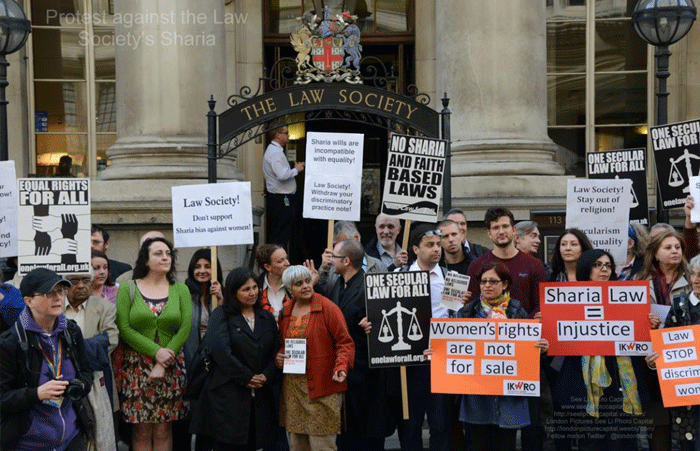
by Lil Tuttle
Following growing complaints that Islamic sharia councils in Britain were discriminating against women, the British Home Secretary ordered an independent review in May 2016 into the application of Islamic sharia law in England and Wales. The final report presented to Parliament this week catalogues many problems with sharia councils and recommends new legislation and regulation to crack down on sharia councils and to ensure Islamic marriage and divorce procedures comply with British civil law – civil law that other religions such as Christianity and Judaism have long complied with.
According to the report, The Independent Review into the Application of Sharia Law in England and Wales, there is currently no clear definition of what constitutes a sharia council, and no accurate statistic on the actual number of sharia councils in operation, although the report estimates between 30 and 85 exist in England and Wales today.
Sharia councils began to form in Britain in the 1980s in heavily Muslim-populated areas and have operated largely in the shadows of British life since. Although they “have no legal status and no legal binding authority under civil law,” according to the report, sharia councils “do in fact act in a decision-making capacity when dealing with Islamic divorce.” Councils are variously organized – some as charities, some as businesses, and others not formally organized at all – but all charge fees for the religious divorces they issue, ranging from £100 to £900.
Islamic Religious Marriage and Divorce
The official report noted that over 90 percent of sharia councils’ clients are Muslim women seeking a divorce from a Muslim husband. These are women whose Islamic religious marriages were never recorded under British civil law, so they lack any protections of British civil law. These women turn to sharia councils as their only recourse.
While sharia law gives a husband an easy path to a religious divorce, there is no simple path – and often no uniform procedures or processes – for the wife.
The husband can publicly proclaim three times “I divorce you,” and the divorce is final three months later, at which time the wife must leave the family home with nothing but the personal financial resources she brought to the marriage.
The wife, on the other hand, must go through a lengthy process to petition for divorce from, and meet conditions set by, local sharia councils. If granted a divorce, she is likely to lose custody of her children and may be asked to grant excessive financial concessions to her husband.
The review found that “evidence provided showed a range of practices, both good and bad, sometimes within the same council.”
From those who gave evidence to the review panel, no one disputed that sharia councils engage in practices which are discriminatory to women.

April 2014 Protest. Photo: Wikimedia Commons/See Li
Report Recommendations
The report made three recommendations to Parliament.
1 – Legislative changes (a) to require Muslim marriages be civilly registered before or at the same time as the Islamic marriage ceremony, and (b) to set legal penalties for a celebrant/officiant of a marriage who fails to register the marriage with civil authorities.
These legislative changes would bring Islamic marriage requirements in line with existing law for Christian, Jewish and other religious marriage by requiring them to be registered with civil authorities. Islamic marriages and divorces could no longer occur in the shadows of British life, and both the husband and wife would have the full protection of British civil law in family disputes.
2 – Awareness campaigns (a) to bring about cultural change with Muslim communities “so that communities acknowledge women’s rights in civil law, especially in areas of marriage and divorce,” and (b) “to ensure that sharia councils operate within the law and comply with best practice, non-discriminatory processes and existing regulatory structures.”
The year-long inquiry discovered that some councils were illegally arbitrating financial remedies and/or child arrangements – issues subject to the Arbitration Act.
3 – Regulatory changes to create a code of practice for sharia councils to follow.
While the first two recommendations should, according to the report, “gradually reduce the use and need for sharia councils” over the long term, Muslim women will continue to look to sharia councils in the immediate and medium term because they have no other choice. As a consequence, a short-term solution is to establish a uniform regulatory code of practice for existing sharia councils.
A Lesson for the U.S.
Some Islamic religious leaders have asked why there can’t be “a safe, protest-free path for sharia” in the U.S. 
Many who have studied Islamic sharia law extensively view it as a form of legalized misogyny, however, since the law – developed in the first century – often requires women and girls to be subservient and obedient to men under ancient male guardianship practices. As such, it is wholly incompatible with American constitutional law and its guarantee of individual rights, freedom and responsibility for all.
The 48-page British report offers one lesson for Americans: never allow sharia law to acquire a foothold in American jurisprudence. There is no need, and should be no desire, in this nation to create an alternative set of legal rules for any religious group, including Muslims.
For a quick look at sharia law and its treatment of women, read our booklet.
